Thomas James Richards, Diaries, Transcript Vol. 3, 26 January to 8 November 1916 - Part 3
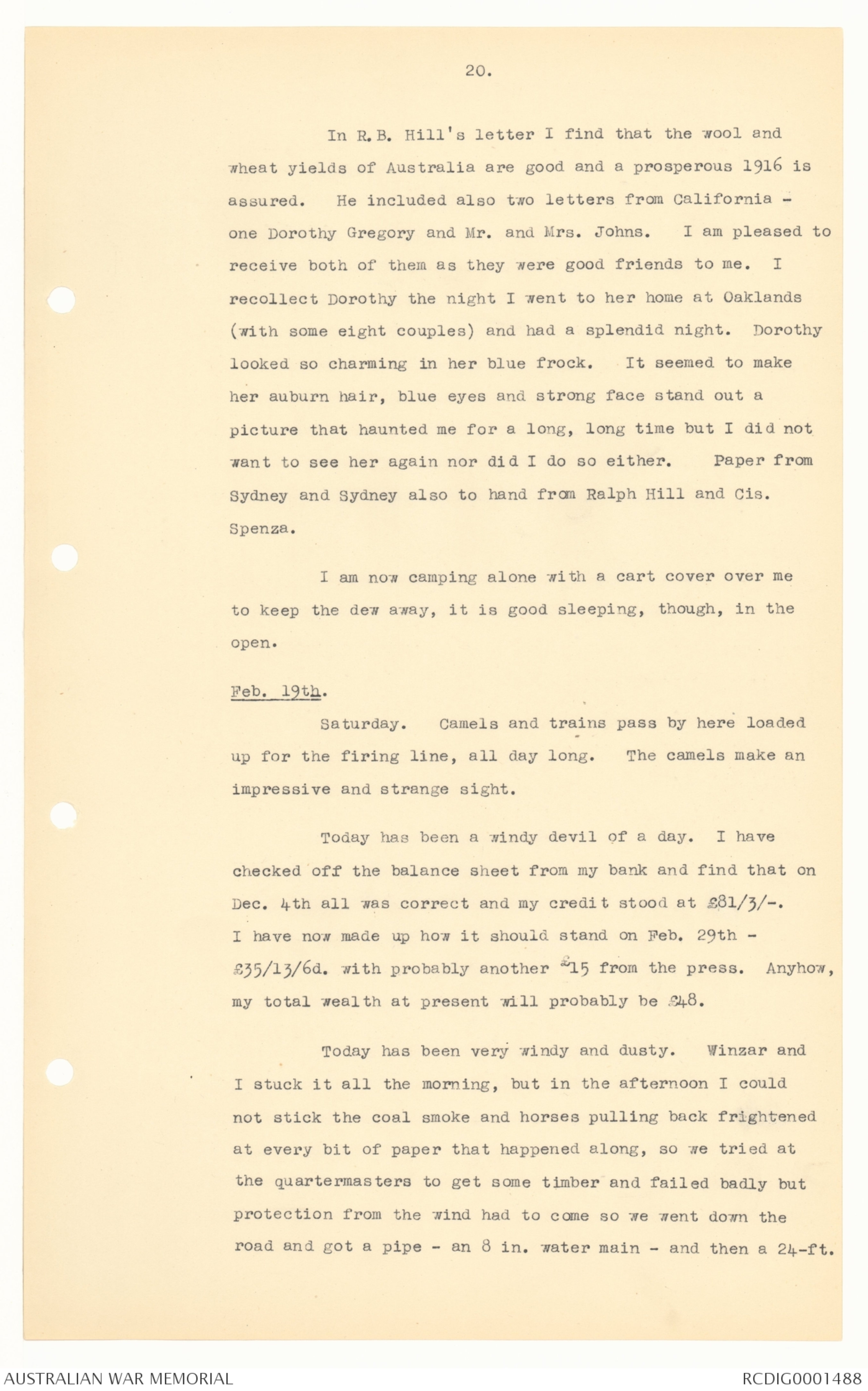
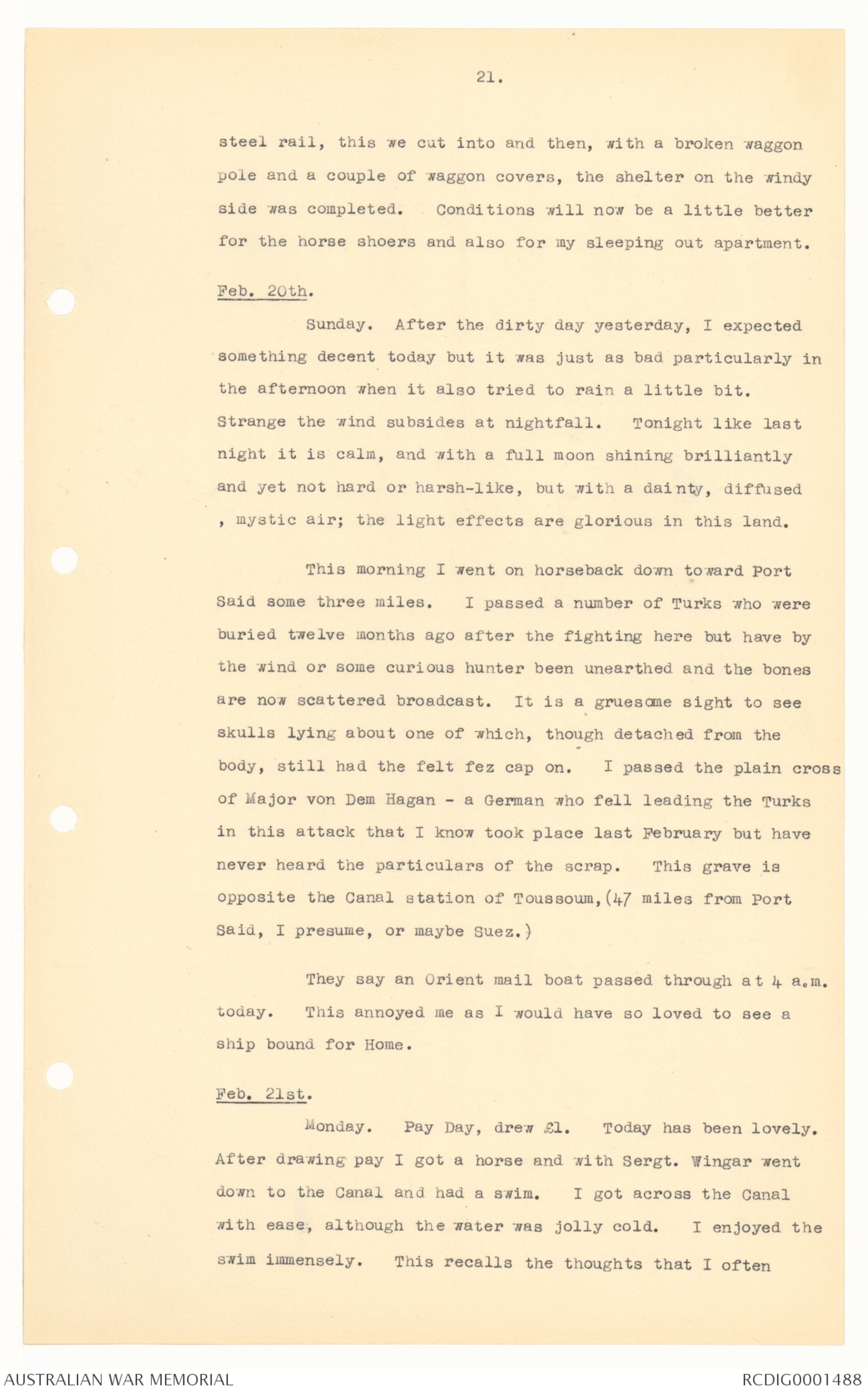
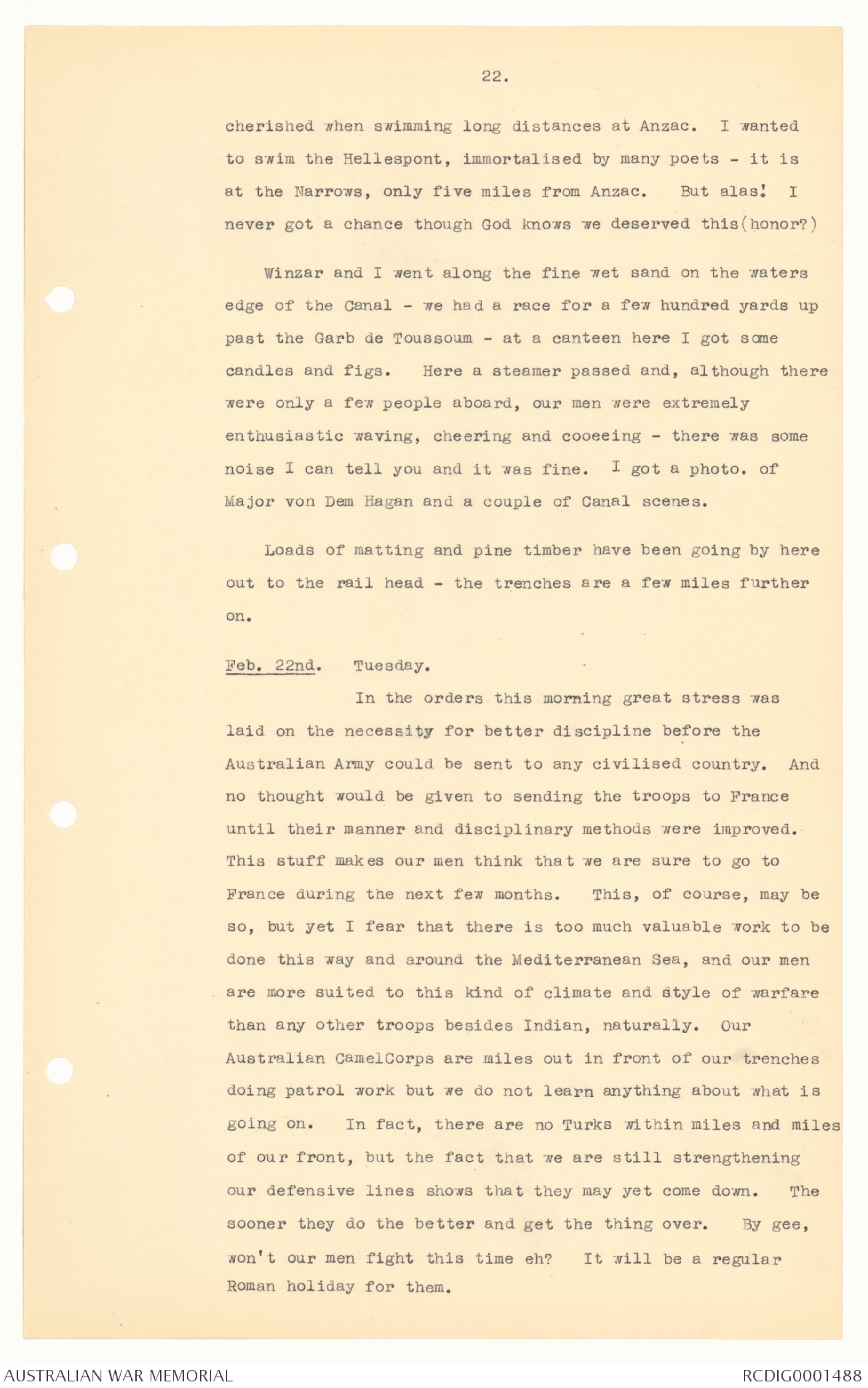
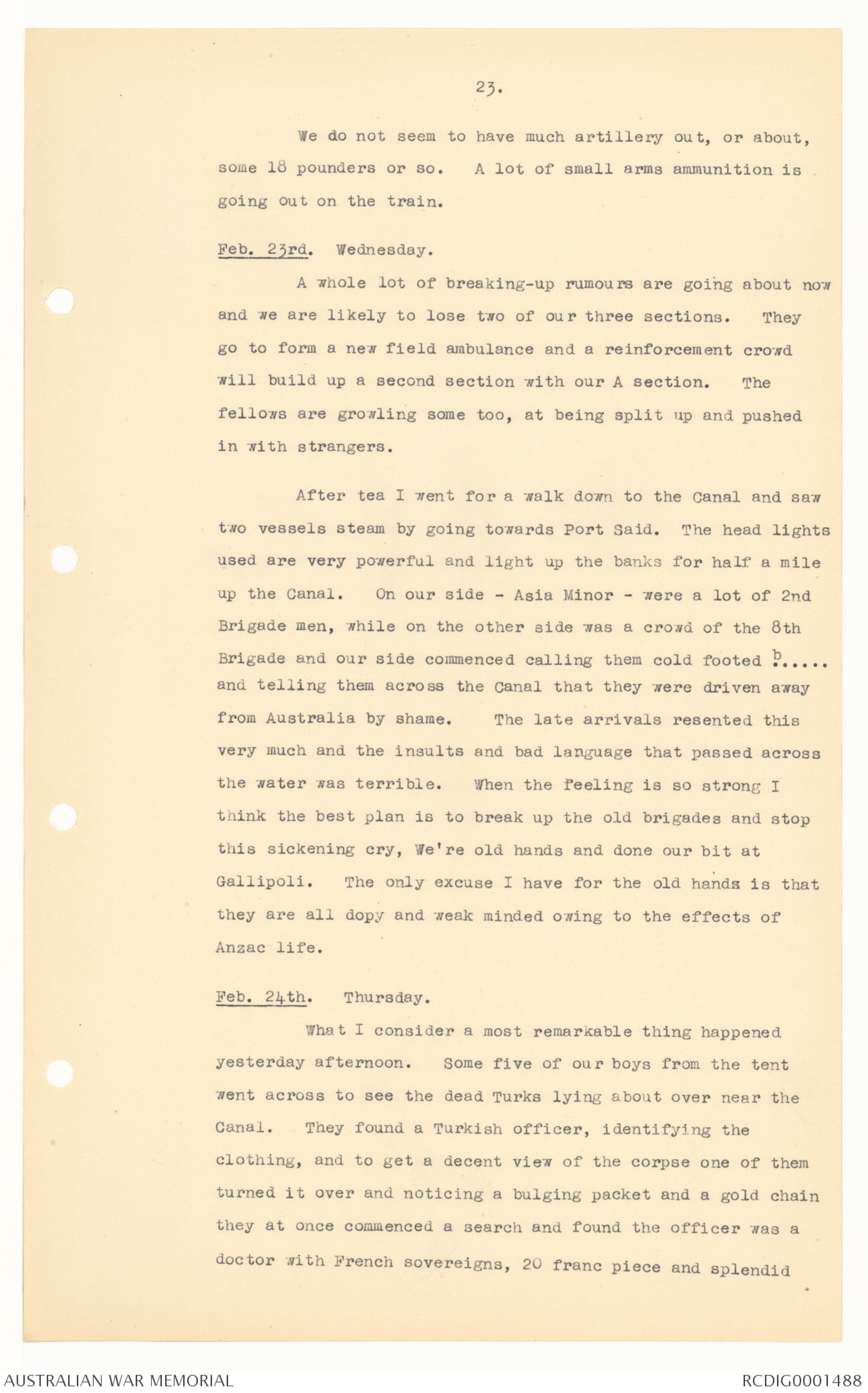
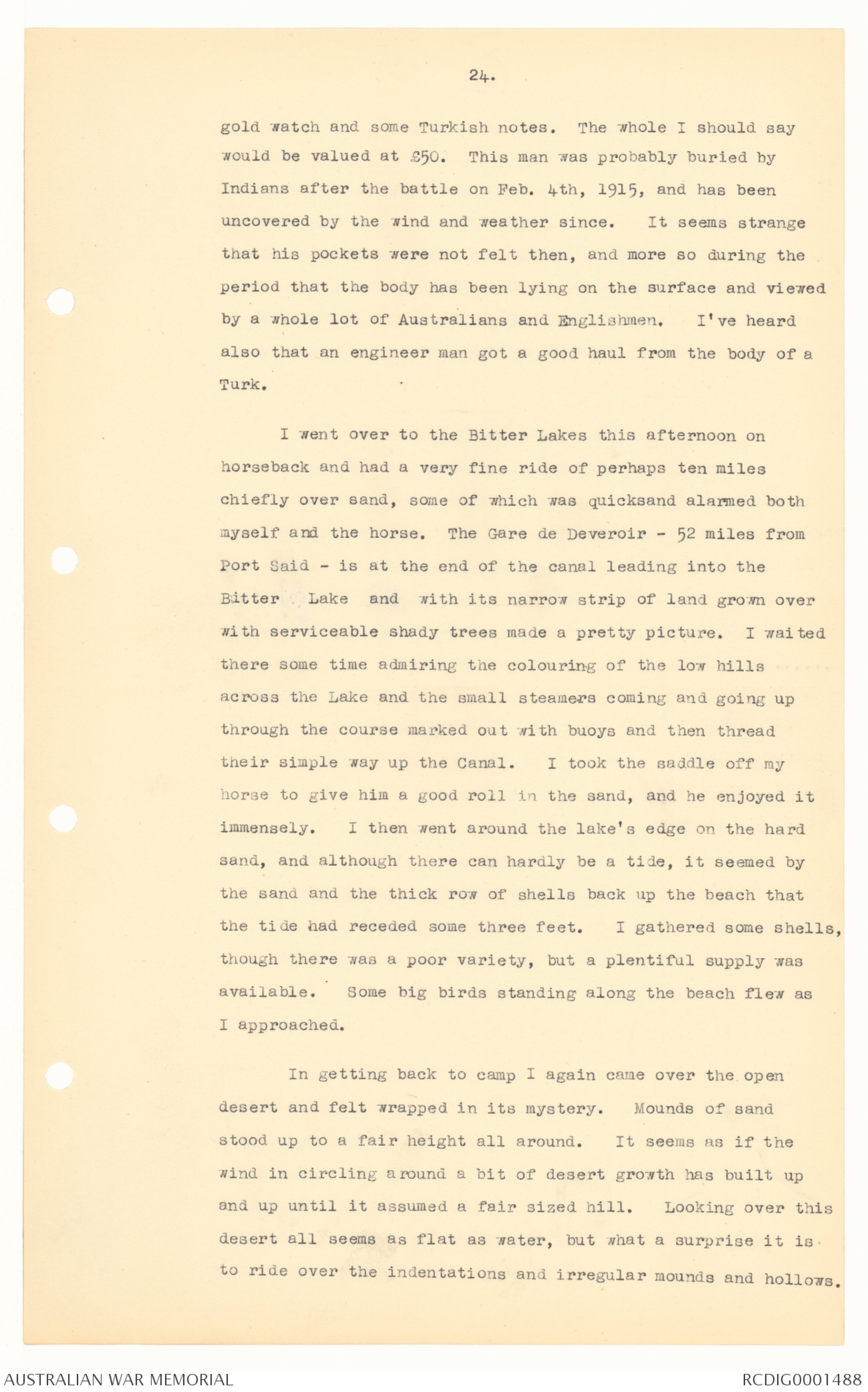
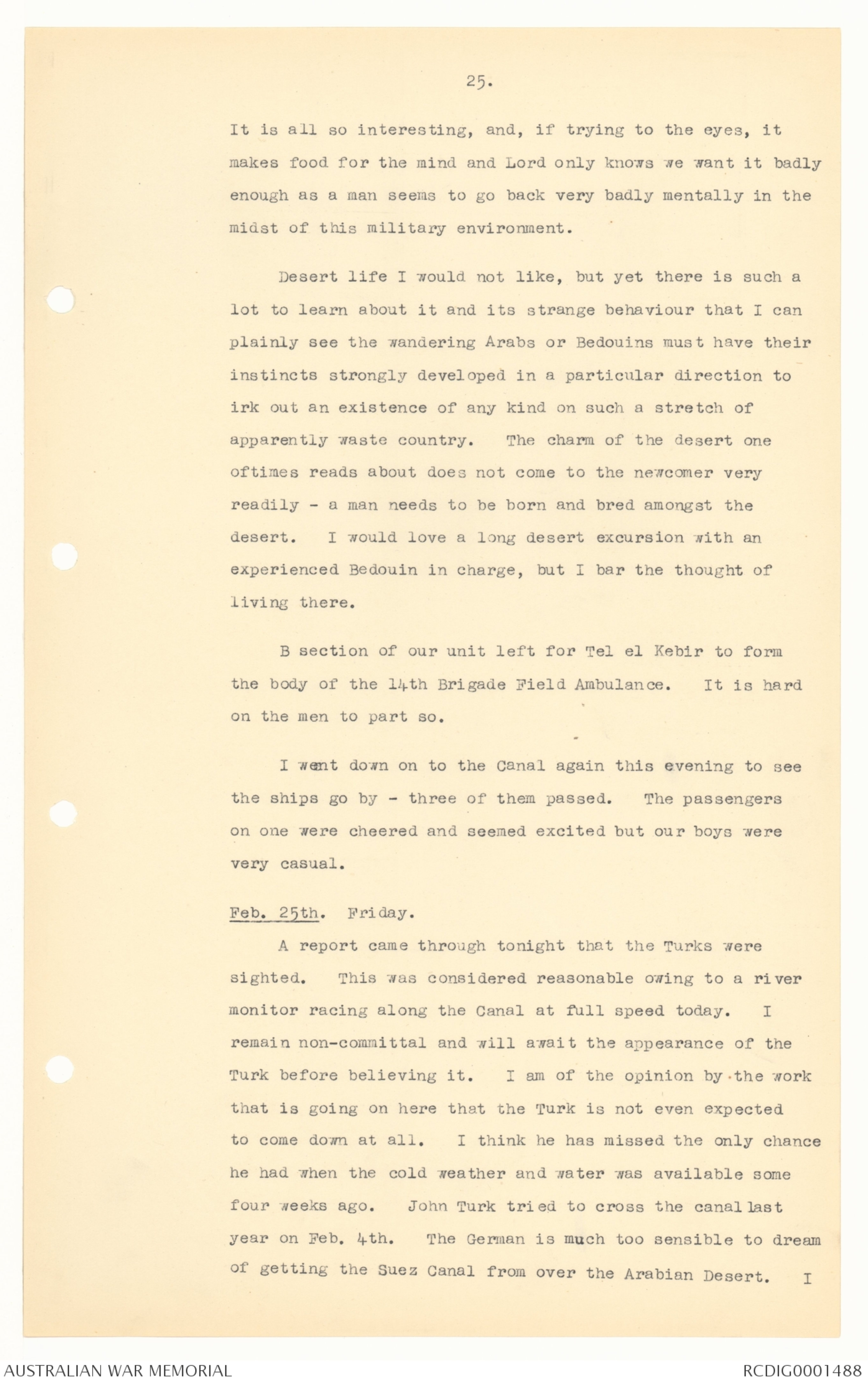
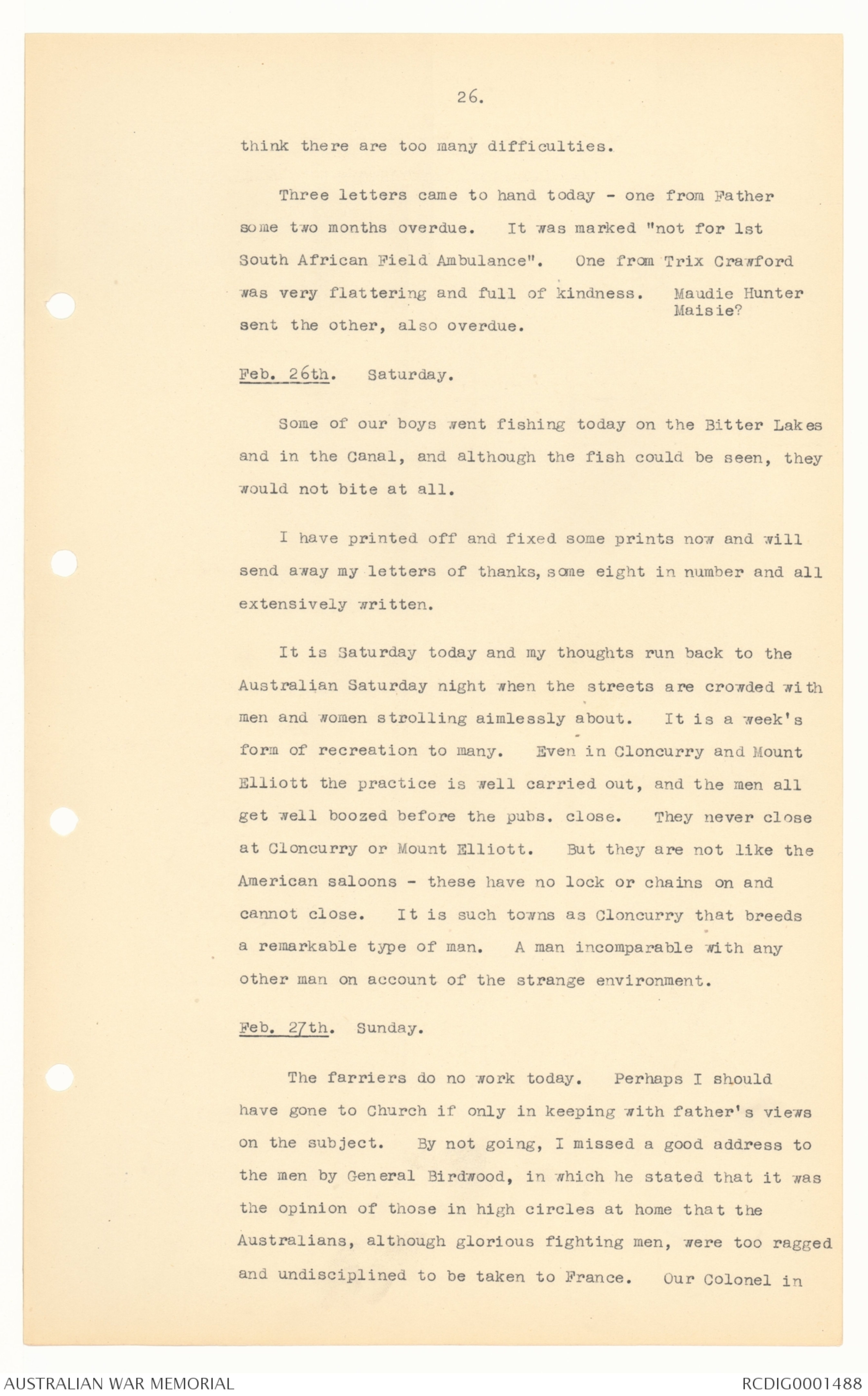
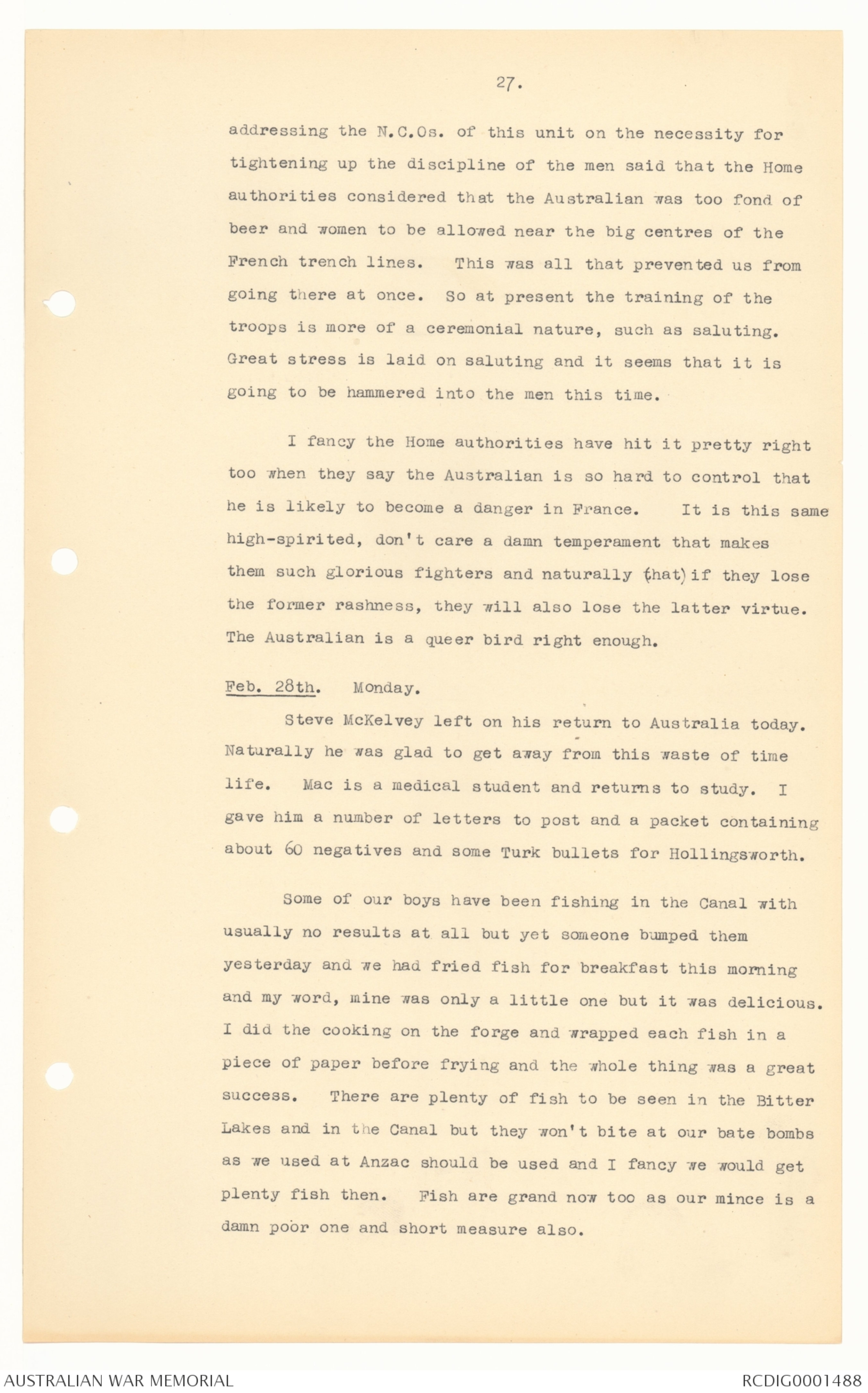
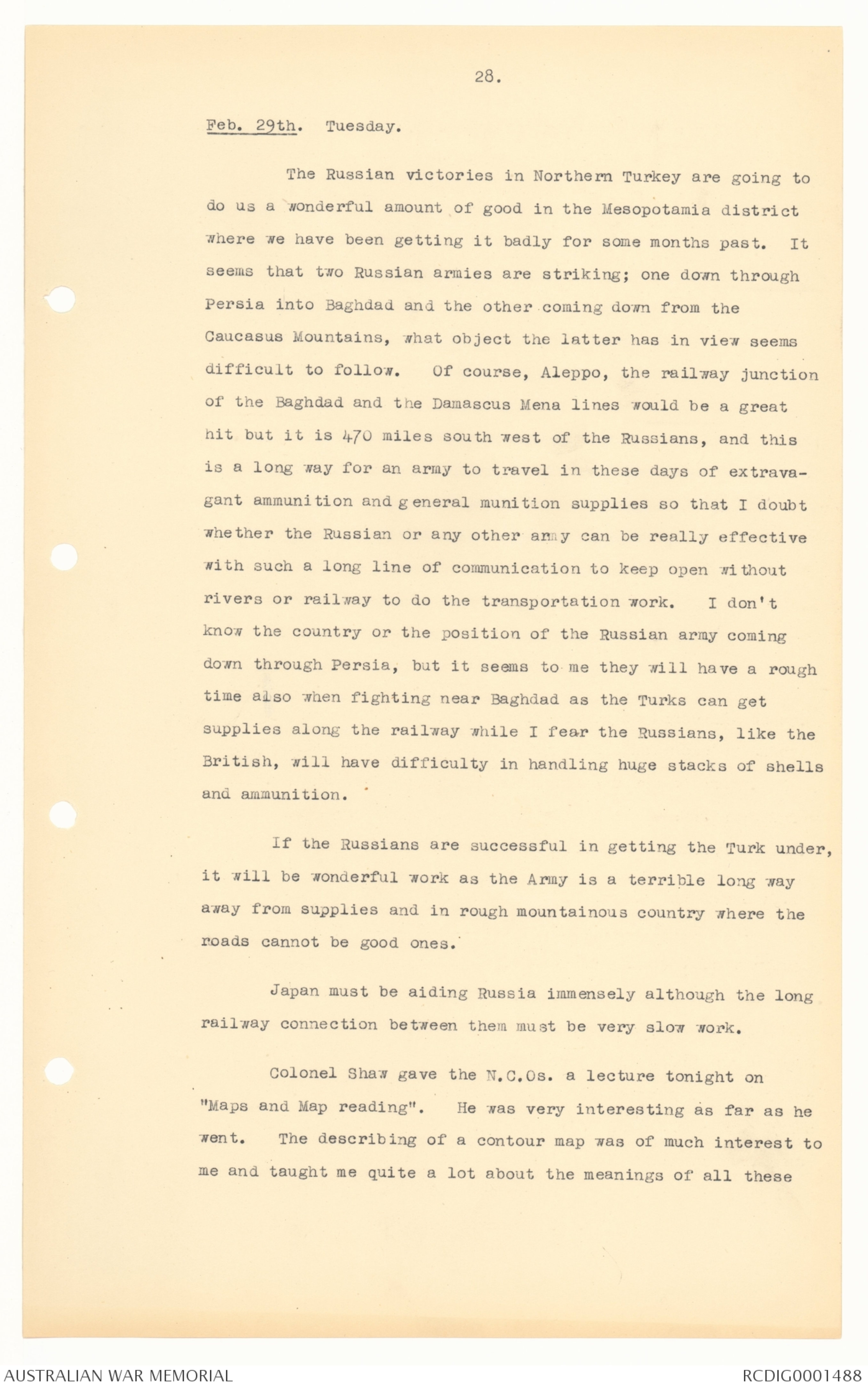
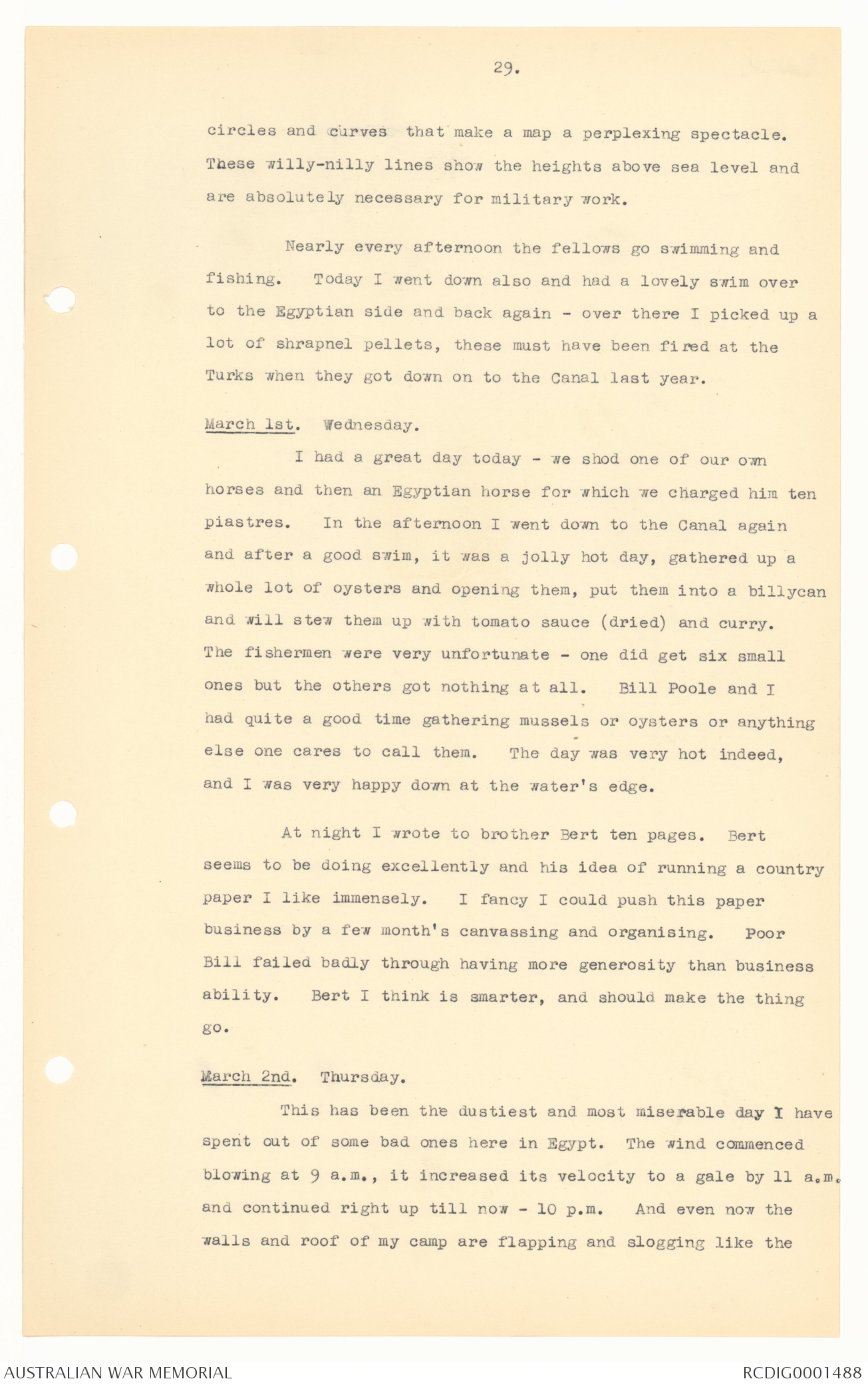
20.
In R.B. Hill's letter I find that the wool and
wheat yields of Australia are good and a prosperous 1916 is
assured. He included also two letters from California -
one Dorothy Gregory and Mr. and Mrs. Johns. I am pleased to
receive both of them as they were good friends to me. I
recollect Dorothy the night I went to her home at Oaklands
(with some eight couples) and had a splendid night. Dorothy
looked so charming in her blue frock. It seemed to make
her auburn hair, blue eyes and strong face stand out a
picture that haunted me for a long, long time but I did not
want to see her again nor did I do so either. Paper from
Sydney and Sydney also to hand from Ralph Hill and Cis.
Spenza.
I am now camping alone with a cart cover over me
to keep the dew away, it is good sleeping, though, in the
open.
Feb. 19th.
Saturday. Camels and trains pass by here loaded
up for the firing line, all day long. The camels make an
impressive and strange sight.
Today has been a windy devil of a day. I have
checked off the balance sheet from my bank and find that on
Dec. 4th all was correct and my credit stood at £81/3-.
I have now made up how it should stand on Feb. 29th -
£35/13/6d. with probably another £15 from the press. Anyhow,
my total wealth at present will probably be £48.
Today has been very windy and dusty. Winzar and
I stuck it all the morning, but in the afternoon I could
not stick the coal smoke and horses pulling back frightened
at every bit of paper that happened along, so we tried at
the quartermasters to get some timber and failed badly but
protection from the wind had to come so we went down the
road and got a pipe - an 8 in. water main - and then a 24-ft.
21.
steel rail, this we cut into and then, with a broken waggon
pole and a couple of waggon covers, the shelter on the windy
side was completed. Conditions will now be a little better
for the horse shoers and also for my sleeping out apartment.
Feb. 20th.
Sunday. After the dirty day yesterday, I expected
something decent today but it was just as bad particularly in
the afternoon when it also tried to rain a little bit.
Strange the wind subsides at nightfall. Tonight like last
night it is calm, and with a full moon shining brilliantly
and yet not hard or harsh-like, but with a dainty, diffused
, mystic air; the light effects are glorious in this land.
This morning I went on horseback down toward Port
Said some three miles. I passed a number of Turks who were
buried twelve months ago after the fighting here but have by
the wind or some curious hunter been unearthed and the bones
are now scattered broadcast. It is a gruesome sight to see
skulls lying about one of which, though detached from the
body, still had the felt fez cap on. I passed the plain cross
of Major von Dem Hagan - a German who fell leading the Turks
in this attack that I know took place last February but have
never heard the particulars of the scrap. This grave is
opposite the Canal station of Toussoum, (47 miles from Port
Said, I presume, or maybe Suez.)
They say an Orient mail boat passed through at 4 a.m.
today. This annoyed me as I would have so loved to see a
ship bound for Home.
Feb. 21st.
Monday. Pay Day, drew £1. Today has been lovely.
After drawing pay I got a horse and with Sergt. Wingar went
down to the Canal and had a swim. I got across the Canal
with ease, although the water was jolly cold. I enjoyed the
swim immensely. This recalls the thoughts that I often
22.
cherished when swimming long distances at Anzac. I wanted
to swim the Hellespont, immortalised by many poets - it is
at the Narrows, only five miles from Anzac. But alas! I
never got a chance though God know we deserved this (honor?)
Winzar and I went along the fine wet sand on the waters
edge of the Canal - we had a race for a few hundred yards up
past the Garb de Toussoum - at a canteen here I got some
candles and figs. Here a steamer passed and, although there
were only a few people aboard, our men were extremely
enthusiastic waving, cheering and cooeeing - there was some
noise I can tell you and it was fine. I got a photo. of
Major von Dem Hagan and a couple of Canal scenes.
Loads of matting and pine timber have been going by here
out to the rail head - the trenches are a few miles further
on.
Feb. 22nd. Tuesday.
In the orders this morning great stress was
laid on the necessity for better discipline before the
Australian Army could be sent to any civilised country. And
no thought would be given to sending the troops to France
until their manner and disciplinary methods were improved.
This stuff makes our men thing that we are sure to go to
France during the next few months. This, of course, may be
so, but yet I fear that there is too much valuable work to be
done this way and around the Mediterranean Sea, and our men
are more suited to this kind of climate and style of warfare
than any other troops besides Indian, naturally. Our
Australian CamelCorps are miles out in front of our trenches
doing patrol work but we do not learn anything about what is
going on. In fact, there are no Turks within miles and miles
of our front, but the fact that we are still strengthening
our defensive lines shows that they may yet come down. The
sooner they do the better and get the thing over. By gee,
won't our men fight this time eh? It will be a regular
Roman holiday for them.
23.
We do not seem to have much artillery out, or about,
some 18 pounders or so. A lot of small arms ammunition is
going out on the train.
Feb. 23rd. Wednesday.
A whole lot of breaking-up rumours are going about now
and we are likely to lose two of our three sections. They
go to form a new field ambulance and a reinforcement crowd
will build up a second section with our A Section. The
fellows are growling some too, at being split up and pushed
in with strangers.
After tea I went for a walk down to the Canal and saw
two vessels steam by going towards Port Said. The head lights
used are very powerful and light up the banks for half a mile
up the Canal. On our side - Asia Minor - were a lot of 2nd
Brigade men, while on the other side was a crowd of the 8th
Brigade and our side commenced calling them cold footed ^b . . . . .
and telling them across the Canal that they were driven away
from Australia by shame. The late arrivals resented this
very much and the insults and bad language that passed across
the water was terrible. When the feeling is so strong I
think the best plan is to break up the old brigades and stop
this sickening cry, We're old hands and done our bit at
Gallipoli. The only excuse I have for the old hands is that
they are all dopy and weak minded owing to the effects of
Anzac life.
Feb. 24th. Thursday.
What I consider a most remarkable thing happened
yesterday afternoon. Some five of our boys from the tent
went across to see the dead Turks lying about over near the
Canal. They found a Turkish officer, identifying the
clothing, and to get a decent view of the corpse one of them
turned it over and noticing a bulging packet and a gold chain
they at once commenced a search and found the officer was a
doctor with French sovereigns, 20 franc piece and splendid
24.
gold watch and some Turkish notes. The whole I should say
would be valued at £50. This man was probably buried by
Indians after the battle on Feb. 4th, 1915, and has been
uncovered by the wind and weather since. It seems strange
that his pockets were not felt then, and more so during the
period that the body has been lying on the surface and viewed
by a whole lot of Australians and Englishmen. I've heard
also that an engineer man got a good haul from the body of a
Turk.
I went over to the Bitter Lakes this afternoon on
horseback and had a very fine ride of perhaps ten miles
chiefly over sand, some of which was quicksand alarmed both
myself and the horse. The Gare de Deveroir - 52 miles from
Port Said - is at the end of the canal leading into the
Bitter Lake and with its narrow strip of land grown over
with serviceable shady trees made a pretty picture. I waited
there some time admiring the colouring of the low hills
across the Lake and the small steamers coming and going up
through the course marked out with buoys and then thread
their simple way up the Canal. I took the saddle off my
horse to give him a good roll in the sand, and he enjoyed it
immensely. I then went around the lake's edge on the hard
sand, and although there can hardly be a tide, it seemed by
the sand and the thick row of shells back up the beach that
the tide had receded some three feet. I gathered some shells,
though there was a poor variety, but a plentiful supply was
available. Some big birds standing along the beach flew as
I approached.
In getting back to camp I again came over the open
desert and felt wrapped in its mystery. Mounds of sand
stood up to a fair height all around. It seems as if the
wind in circling around a bit of desert growth has built up
and up until it assumed a fair sized hill. Looking over this
desert all seems as flat as water, but what a surprise it is
to ride over the indentations and irregular mounds and hollows.
25.
It is all so interesting, and, if trying to the eyes, it
makes food for the mind and Lord only knows we want it badly
enough as a man seems to go back very badly mentally in the
midst of this military environment.
Desert life I would not like, but yet there is such a
lot to learn about it and its strange behaviour that I can
plainly see the wandering Arabs or Bedouins must have their
instincts strongly developed in a particular direction to
irk out an existence of any kind on such a stretch of
apparently waste country. The charm of the desert one
oftimes reads about does not come to the newcomer very
readily - a man needs to be born and bred amongst the
desert. I would love a long desert excursion with an
experienced Bedouin in charge, but I bar the thought of
living there.
B section of our unit left for Tel el Kebir to form
the body of the 14th Brigade Field Ambulance. It is hard
on the men to part so.
I went down on to the Canal again this evening to see
the ships go by - three of them passed. The passengers
on one were cheered and seemed excited but our boys were
very casual.
Feb. 25th. Friday.
A report came through tonight that the Turks were
sighted. This was considered reasonable owing to a river
monitor racing along the canal at full speed today. I
remain non-committal and will await the appearance of the
Turk before believing it. I am of the opinion by the work
that is going on here that the Turk is not even expected
to come down at all. I think he has missed the only chance
he had when the cold weather and water was available some
four weeks ago. John Turk tried to cross the canal last
year on Feb. 4th. The German is much too sensible to dream
of getting the Suez Canal from over the Arabian Desert. I
26.
think there are too many difficulties.
Three letters came to hand today - one from Father
some two months overdue. It was marked "not for 1st
South African Field Ambulance". One from Trix Crawford
and was very flattering and full of kindness. Maudie ∇Maisie? Hunter
sent the other, also overdue.
Feb. 26th. Saturday.
Some of our boys went fishing today on the Bitter Lakes
and in the Canal, and although the fish could be seen, they
would not bite at all.
I have printed off and fixed some prints now and will
send away my letters of thanks, some eight in number and all
extensively written.
It is Saturday today and my thoughts run back to the
Australian Saturday night when the streets are crowded with
men and women strolling aimlessly about. It is a week's
form of recreation to many. Even in Cloncurry and Mount
Elliott the practice is well carried out, and the men all
get well boozed before the pubs. close. They never close
at Cloncurry or Mount Elliott. But they are not like the
American saloons - these have no lock or chains on and
cannot close. It is such towns as Cloncurry that breeds
a remarkable type of man. A man incomparable with any
other man on account of the strange environment.
Feb. 27th. Sunday.
The farriers do no work today. Perhaps I should
have gone to Church if only in keeping with father's views
on the subject. By not going, I missed a good address to
the men by General Birdwood, in which he stated that it was
the opinion of those in high circles at home that the
Australians, although glorious fighting men, were too ragged
and undisciplined to be taken to France. Our Colonel in
27.
addressing the N.C.Os. of this unit on the necessity for
tightening up the discipline of the men said that the Home
authorities considered that the Australian was too fond of
beer and women to be allowed near the big centres of the
French trench lines. This was all that prevented us from
going there at once. So at present the training of the
troops is more of a ceremonial nature, such as saluting.
Great stress is laid on saluting and it seems that it is
going to be hammered into the men this time.
I fancy the Home authorities have hit it pretty right
too when they say the Australian is so hard to control that
he is likely to become a danger in France. It is this same
high-spirited, don't care a damn temperament that makes
them such glorious fighters and naturally (that) if they lose
the former rashness, they will also lose the latter virtue.
The Australian is a queer bird right enough.
Feb. 28th. Monday.
Steve McKelvey left on his return to Australia today.
Naturally he was glad to get away from this waste of time
life. Mac is a medical student and returns to study. I
gave him a number of letters to post and a packet containing
about 60 negatives and some Turk bullets for Hollingsworth.
Some of our boys have been fishing in the Canal with
usually no results at all but yet someone bumped them
yesterday and we had fried fish for breakfast this morning
and my word, mine was only a little one but it was delicious.
I did the cooking on the forge and wrapped each fish in a
piece of paper before frying and the whole thing was a great
success. There are plenty or fish to be seen in the Bitter
Lakes and in the Canal but they won't bite at our bate bombs
as we used at Anzac should be used and I fancy we would get
plenty fish then. Fish are grand now too as our mince is a
damn poor one and short measure also.
28.
Feb. 29th. Tuesday.
The Russian victories in Northern Turkey are going to
do us a wonderful amount of good in the Mesopotamia district
where we have been getting it badly for some months past. It
seems that two Russian armies are striking; one down through
Persia into Baghdad and the other coming down from the
Caucasus Mountains, what object the latter has in view seems
difficult to follow. Of course, Aleppo, the railway junction
of the Baghdad and the Damascus Mena lines would be a great
hit but it is 470 miles south west of the Russians, and this
is a long way for an army to travel in these days of extravagant
ammunition and general munition supplies so that I doubt
whether the Russian or any other army can be really effective
with such a long line of communication to keep open without
rivers or railway to do the transportation work. I don't
know the country or the position of the Russian army coming
down through Persia, but it seems to me they will have a rough
times also when fighting near Baghdad as the Turks can get
supplies along the railway while I fear the Russians, like the
British, will have difficulty in handling huge stacks of shells
and ammunition.
If the Russians are successful in getting the Turk under,
it will be wonderful work as the Army is a terrible long way
away from supplies and in rough mountainous country where the
roads cannot be good ones.
Japan must be aiding Russia immensely although the long
railway connection between them must be very slow work.
Colonel Shaw gave the N.C.Os. a lecture tonight on
"Maps and Map reading". He was very interesting as far as he
went. The describing of a contour map was of much interest to
me and taught me quite a lot about the meanings of all these
29.
circles and curves that make a map a perplexing spectacle.
These willy-nilly lines show the heights above sea level and
are absolutely necessary for military work.
Nearly every afternoon the fellows go swimming and
fishing. Today I went down also and had a lovely swim over
to the Egyptian side and back again - over there I picked up a
lot of shrapnel pellets, these must have been fired at the
Turks when they got down on to the Canal last year.
March 1st. Wednesday.
I had a great day today - we shod one of our own
horses and then an Egyptian horse for which we charged him ten
piastres. In the afternoon I went down to the Canal again
and after a good swim, it was a jolly hot day, gathered up a
whole lot of oysters and opening them, put them into a billycan
and will stew them up with tomato sauce (dried) and curry.
The fishermen were very unfortunate - one did get six small
ones but the others got nothing at all. Bill Poole and I
had quite a good time gathering mussels or oysters or anything
else one cares to call them. The day was very hot indeed,
and I was very happy down at the water's edge.
At night I wrote to brother Bert ten pages. Bert
seems to be doing excellently and his idea of running a country
paper I like immensely. I fancy I could push this paper
business by a few month's canvassing and organising. Poor
Bill failed badly through having more generosity than business
ability. Bert I think is smarter, and should make the thing
go.
March 2nd. Thursday.
This has been the dustiest and most miserable day I have
spent out of some bad ones here in Egypt. The wind commenced
blowing at 9 a.m. , it increased its velocity to a gale by 11 a.m.
and continued right up till now - 10 p.m. And even now the
walls and roof of my camp are flapping and slogging like the
of my camp are flapping and slogging like the
 Sam scott
Sam scottThis transcription item is now locked to you for editing. To release the lock either Save your changes or Cancel.
This lock will be automatically released after 60 minutes of inactivity.